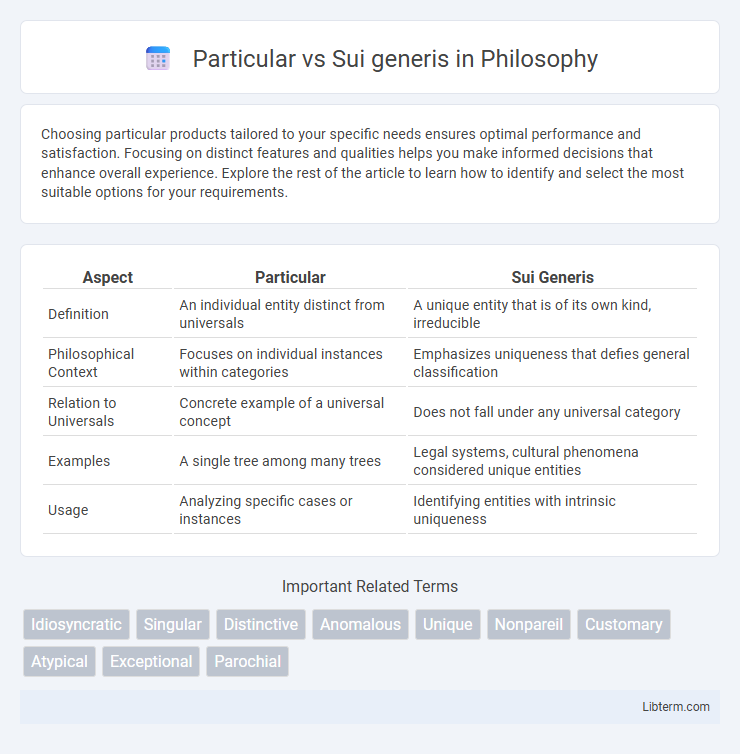Choosing particular products tailored to your specific needs ensures optimal performance and satisfaction. Focusing on distinct features and qualities helps you make informed decisions that enhance overall experience. Explore the rest of the article to learn how to identify and select the most suitable options for your requirements.
Table of Comparison
| Aspect | Particular | Sui Generis |
|---|---|---|
| Definition | An individual entity distinct from universals | A unique entity that is of its own kind, irreducible |
| Philosophical Context | Focuses on individual instances within categories | Emphasizes uniqueness that defies general classification |
| Relation to Universals | Concrete example of a universal concept | Does not fall under any universal category |
| Examples | A single tree among many trees | Legal systems, cultural phenomena considered unique entities |
| Usage | Analyzing specific cases or instances | Identifying entities with intrinsic uniqueness |
Understanding "Particular": Definition and Context
Particular" refers to a specific, individual instance or detail within a broader category, emphasizing distinctiveness and uniqueness in legal, philosophical, or everyday contexts. It denotes entities or facts that are concrete and identifiable, contrasting with general or abstract concepts. Understanding "particular" is essential for differentiating specific cases and tailored applications within laws, theories, or discussions.
Exploring "Sui Generis": Meaning and Origin
Sui generis" is a Latin phrase meaning "of its own kind" or "unique in its characteristics," highlighting something that does not fit into conventional categories. Originating from Roman law, it underscores entities or concepts that possess distinctive attributes warranting separate classification. This legal and philosophical term emphasizes individuality and singularity, distinguishing sui generis cases from particular or common types.
Key Differences Between Particular and Sui Generis
The key differences between Particular and Sui generis lie in their scope and application; Particular refers to specific, individual cases or entities within a broader category, while Sui generis denotes a unique, one-of-a-kind classification that does not fit into existing categories. Particular cases operate under established norms and frameworks, whereas Sui generis entities require bespoke rules tailored to their distinct nature. This distinction is crucial in legal, philosophical, and taxonomic contexts where classification precision impacts interpretation and decision-making.
Historical Development of Both Concepts
Particular and sui generis concepts have evolved through distinct historical trajectories, with particular emerging from classical legal traditions emphasizing specific, categorized norms applicable to defined entities. Sui generis, Latin for "of its own kind," developed later in modern legal and philosophical discourse to describe unique, unprecedented cases that defy traditional classification. This evolution reflects a shift from rigid normative frameworks toward recognizing singular entities requiring specialized legal treatment or conceptual understanding.
Applications in Law: Particular vs Sui Generis
Particular legal frameworks address specific issues through laws designed for defined categories, such as contract law or criminal statutes, ensuring clarity and uniform application. Sui generis legal applications involve unique, standalone systems tailored to exceptional cases or categories, like indigenous land rights or intellectual property regimes, offering specialized protection beyond general law. The distinction is critical for legal practitioners to determine when to apply standardized rules versus customized legal principles crafted for singular contexts.
Usage in Philosophy and Academic Discourse
Particular refers to individual, concrete entities or instances within philosophy and academic discourse, emphasizing specificity and distinctness in analysis. Sui generis denotes concepts or phenomena considered unique and not reducible to broader categories, highlighting their distinct ontological or methodological status. Usage of particular often aids detailed examination of specific cases, while sui generis underscores the exceptional nature of studied subjects, influencing interpretive frameworks and theoretical models.
Relevance in Intellectual Property Rights
Particular intellectual property rights refer to specific categories such as patents, trademarks, and copyrights, each governed by distinct legal frameworks targeting defined subject matter. Sui generis rights are unique legal protections created for intellectual property types that do not fit traditional categories, such as database rights or plant breeders' rights, addressing gaps in conventional IP law. The relevance in intellectual property rights lies in ensuring comprehensive protection tailored to diverse innovations and creations, facilitating effective enforcement and encouraging innovation.
Examples Illustrating the Distinction
In legal contexts, particular examples illustrate the distinction between "particular" laws that apply to specific cases, such as parking regulations for a certain street, and "sui generis" laws, which create unique categories like intellectual property rights or indigenous land tenure systems. A particular zoning ordinance targeting noise limits in a neighborhood contrasts with sui generis legislation granting special protections to historic landmarks. These examples highlight how particular rules govern narrowly defined situations while sui generis laws establish exclusive frameworks for distinct legal phenomena.
Implications in Modern Policy Making
The distinction between Particular and Sui generis legal categories influences modern policy-making by shaping regulatory frameworks that address specific contexts versus unique, standalone entities. Particular classifications allow for tailored policies targeting defined groups or issues, while Sui generis categories necessitate bespoke legal approaches acknowledging exceptional characteristics. This differentiation ensures more precise governance, enabling policymakers to balance specificity with flexibility in areas such as intellectual property, environmental law, and minority rights.
Choosing the Right Term: Contextual Considerations
Choosing between "particular" and "sui generis" hinges on the specificity and uniqueness of the subject within its context. "Particular" emphasizes specificity and detail relevant to a known category, while "sui generis" signifies an entity that is inherently unique and cannot be classified under existing categories. Legal, philosophical, or academic discourse often requires assessing the context to determine if the subject is an instance of a broader set (particular) or an incomparable, one-of-a-kind phenomenon (sui generis).
Particular Infographic

 libterm.com
libterm.com